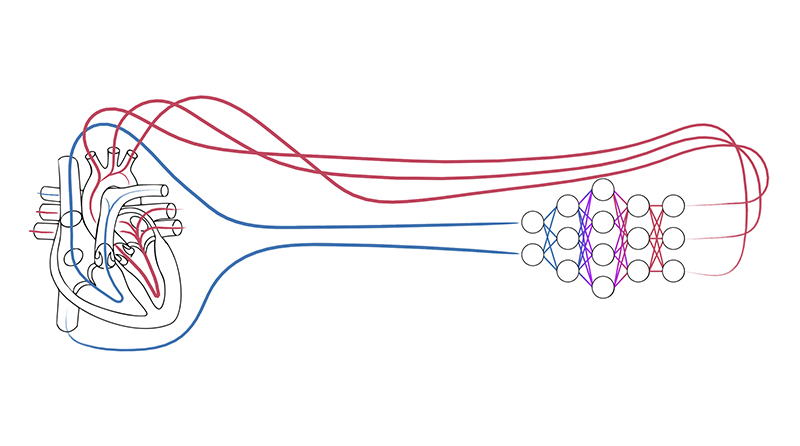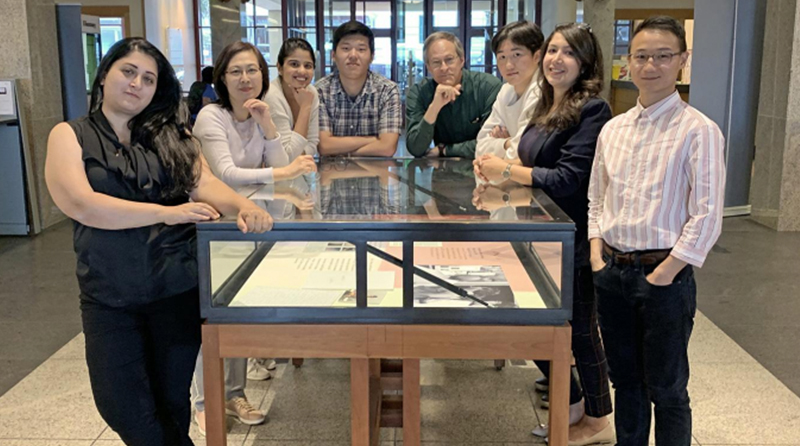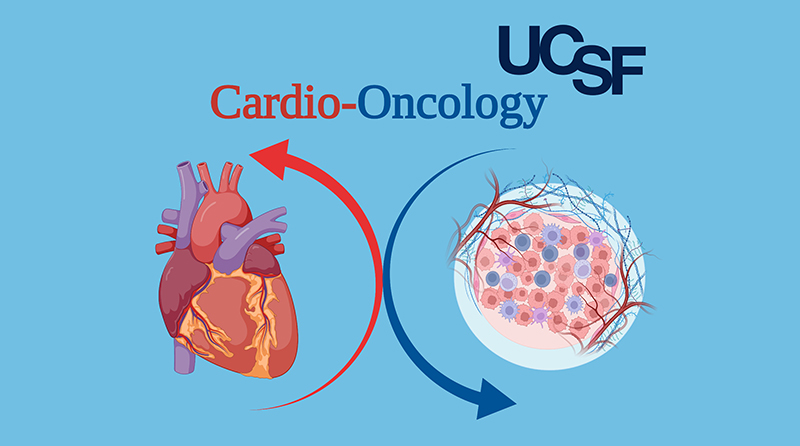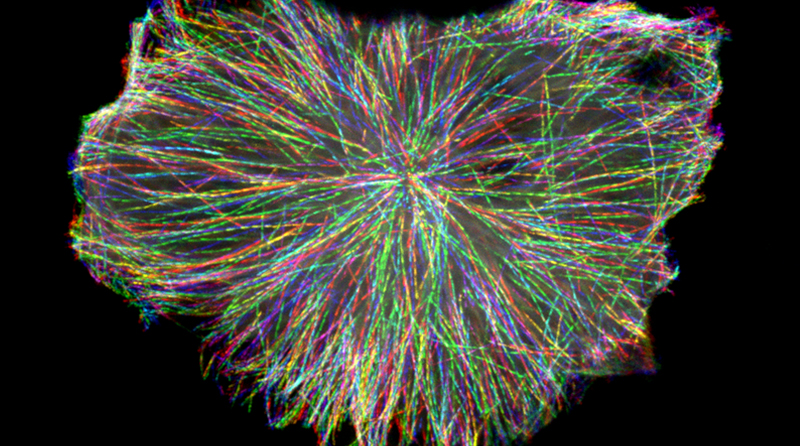Research Programs and Labs
Faculty Labs
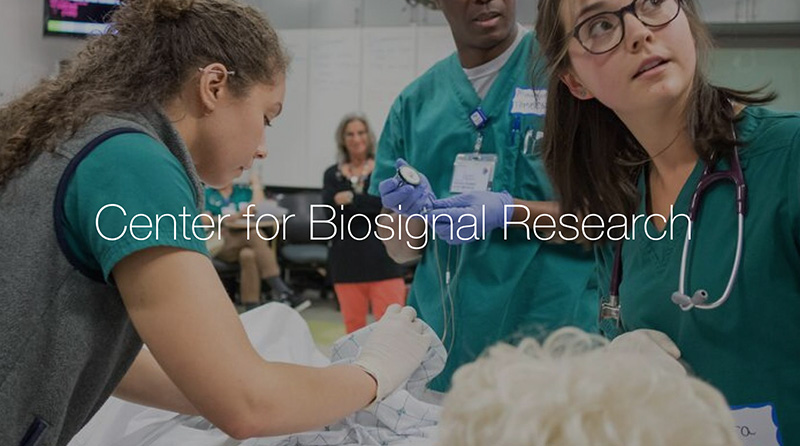
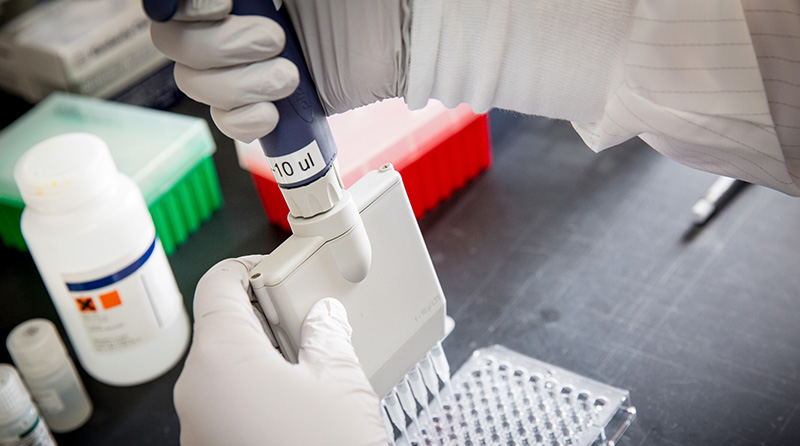
Faculty Research
Roselle Abraham
Dr. Roselle Abraham is a physician-scientist with a background in electrophysiology, imaging, and stem cell research. She is using multi-modality imaging for risk stratification of atrial and ventricular arrhythmias. The overall goal of her research program is to use a combination of multi-modality clinical imaging and studies in model systems to tailor therapies for patients with hypertrophic cardiomyopathy.
Theodore Abraham
Dr. Abraham's research is focused on early diagnosis and risk prediction in Hypertrophic Cardiomyopathy (HCM). He also has an interest in using strain echocardiography for early diagnosis, monitoring disease progression, and prognostication in a variety of cardiac diseases, particularly, cardiomyopathies and heart disease in athletes.
Anu Agarwal
Dr. Agarwal's research interests include clinical research in the areas of echocardiography, pregnancy in heart disease, adult CHD and CPET. In particular, she is interested in outcomes research aimed to reduce mortality, morbidity, and to improve quality of life for adults with CHD. She has been using large data methodology to help understand the health care needs of this patient population. More recently, she has been working on improving transitions of care for adults with CHD transitioning from pediatric to adult health care. Her primary goal is to promote patient empowerment to improve outcomes for these patients.
Yousif Ahmad
Dr. Ahmad’s research into coronary and aortic physiology saw him awarded a PhD from Imperial College London. His thesis focused on the interaction between coronary hemodynamics and aortic stenosis and this work lead to him being awarded the American Heart Association Samuel A. Levine Young Clinical Investigator Award, the EuroPCR Young Investigator Award and the American College of Cardiology Young Author Achievement Award. His ongoing research interests pertain to improving outcomes for patients undergoing percutaneous coronary and valvular procedures, and he is renowned for his expertise in utilizing meta-analytic methodology to pool data to inform clinical practice.
Mandar Aras
Dr. Aras's research interests are in understanding genetic and molecular mechanisms of heart failure, and developing novel biomarkers in patients with advanced heart disease.
Joshua Barrios
Dr. Barrios brings together expertise in physiology, systems neuroscience, and advanced machine learning algorithms to automate clinical processes, expand diagnostic utility of existing clinical tests, and elucidate mechanisms of disease. He has developed multiple deep learning based systems for automated detection of diseases such as mitral valve prolapse, hypertrophic cardiomyopathy, and pulmonary hypertension from electrocardiograms, echocardiograms, and other clinical data modalities. His work aims to improve the sensitivity of our health system as a whole, increasing early detection of disease and the efficacy of preventative care.
Joseph Bayne
Dr. Joseph Bayne is a cardiologist with specialization in Adult Congenital Heart Disease. He studies the genetic and environmental factors that contribute to the increased risk of pulmonary vascular disease in patients with congenital heart disease.
Leila Beach
Dr. Beach's research focuses on the development of new medical devices and therapies to treat chronic and acute decompensated (suddenly exacerbated) heart failure. She is involved in multiple clinical studies and works to connect patients with appropriate clinical trials and testing of new therapies.
Claudio Bravo
Dr. Bravo's research focuses on discovering new molecular mechanisms and pharmacological targets for treating right ventricular failure using multi-omics.
Elias Botvinick
Dr. Botvinick’s primary research interest has been scintigraphic methods. His research involves recent applications of the scintigraphic imaging agent indicates its ability to map the regional density of sympathetic nerves and support the hypothesis that an altered balance in the relationship of perfusion and innervation can increase vulnerability to life threatening arrhythmias.
Overall, Dr. Botvinick’s research has been a collaborative effort to develop non-invasive graphic and imaging methods for the identification and evaluation of cardiac anatomy and pathophysiology, and apply them to the diagnosis, risk stratification and monitoring of clinical disease.
Samuel Brusca
Dr. Brusca's research interests include cardiac intensive care unit process improvement and educational initiatives and using peripheral biomarkers to phenotype and risk stratify patients with pulmonary hypertension and shock.
Jan Christoph
Jan Christoph studies the heart from a complex and dynamical systems perspective. He is interested in arrhythmia mechanisms and the coupling between electrophysiology and tissue mechanics, as well as electromechanical feedback. He uses computational methods, artificial intelligence and high-resolution imaging to study the heart.
Jackie DesJardin
Dr. DesJardin focuses her area of study on pulmonary hypertension and heart failure, with a specific focus on improving diagnosis and treatment of these conditions.
Francesca Delling
Dr. Delling's research has focused on mitral valve disease and the combined use of echocardiography, cardiac MRI, and molecular genetics as tools to better understand disease mechanisms and progression. She is currently an NIH-funded investigator (previously supported by the American Heart Association) with collaborators at the Framingham Heart Study and the Leducq MITRAL Network in Europe. Attended coursework essential for her research endeavors includes a Master in Public Health (Harvard T.H. Chan School of Public Health).
Teresa De Marco
Dr. De Marco is interested in translational research in the diagnosis, prognosis, medical and surgical treatment for advanced heart failure, cardiomyopathies, heart transplantation, mechanical circulatory support, and pulmonary hypertension.
Shalini Dixit
Dr. Dixit's research interests pertain to using novel imaging modalities, such as strain echocardiography, for the detection of subclinical cardiomyopathies and the prediction of future cardiovascular events.
Ramzi Dudum
Dr. Dudum's research interests include, preventive cardiology, artificial intelligence, incidental coronary artery calcium, coronary artery calcium, implementation science and population health.
Sammy Elmariah
Dr. Elmariah's research focuses on the prediction and optimization of clinical outcomes of patients with aortic stenosis and after transcatheter aortic valve replacement.
Michela Faggioni
Dr Faggioni’s research focuses on ways to improve clinical outcomes for patients having interventional cardiology procedures.
Kirsten Fleischmann
Dr. Fleischmann research looks at the relationship between noninvasive testing in cardiology and its outcome, the development and evaluation of efficient diagnostic and treatment strategies in acute ischemic syndromes, and the effect of secondhand smoke on outcomes in cardiac disease such as heart failure and acute ischemic syndromes.
Gordon Fung
Dr. Fung's research looks at health disparities primarily involving the Asian/Pacific Islander populations as well as clinical hypertension and prevention.
Prerna Gupta
Dr. Gupta’s academic focus is on utilizing mobile health to augment cardiovascular care outcomes and delivery, and cardiovascular epidemiology. Dr. Gupta has worked on several studies utilizing pragmatic mobile health approaches in patients with cardiovascular disease to improve adherence to medication and cardiac rehabilitation. She has investigated approaches to make mobile health interventions more amenable to patients and clinicians. Within cardiovascular epidemiology, Dr. Gupta has investigated opportunities to improve cardiovascular disease prevention, seasonal cycles of heart failure exacerbations and differences in heart failure among men and women. In addition, Dr. Gupta has authored studies in activity monitoring in critical care settings and circadian rhythm analysis using wearables.
Edward Gerstenfeld
Dr. Gerstenfeld's laboratory is interested in better understanding the mechanism of atrial fibrillation using signal processing and humans and preclinical models studying differences between endocardial and epicardial activation during AF. Dr Gerstenfeld's laboratory has one of the only preclinical swine models of pacing-induced cardiomyopathy and seeks to better understand the mechanism of cardiomyopathy caused by premature ventricular beats. He also has performed preclinical work to improve ablation techniques for ventricular tachycardia, including hi-intensity ultrasound (HiFU) and multipolar linear ablation.
Ian Harris
Dr. Harris' research focuses generally on the molecular mechanisms underlying cardiac development and growth and specifically on the transcriptional control of genes during cardiac development.
Henry Hsia
Dr. Hsia's research has helped to develop new treatment strategies by deploying a substrate-based ablation for ventricular tachycardia, particularly in patients with ventricular arrhythmias that are unstable, with multiple morphologies, and not amendable to conventional mapping techniques.
Ada Ip
Dr. Ip focuses on clinical outcomes research following percutaneous cardiac interventions.
Liviu Klein
Dr. Klein's research is aimed at understanding the epidemiology of heart failure in women and sudden cardiac death in women with heart failure. In addition, I am developing new diagnostic sensors and therapeutic devices for patients with cardiovascular disease, including patients with heart failure. At UCSF, he is the Director of the Cardiology Clinical Research infrastructure.
Julio Lamprea-Montealegre
In his research, Dr. Lamprea-Montealegre uses epidemiologic methods to investigate the cardiovascular consequences of chronic kidney disease. In addition, he leverages implementation science theory and frameworks to improve cardiovascular disease prevention through the early detection and treatment of chronic kidney disease.
Di Lang
In his research, Di Lang, PhD studies the membrane nanodomain mediated compartmentalized cellular and molecular functioning and regulation of proteins in cardiac physiology and pathology and developing therapeutic strategies targeting the cell cytoarchitectures using animal models, primary cardiomyocytes and human induced pluripotent stem cells (hiPSCs).
Christopher Lee
Dr. Lee's research focuses on using novel methods to assess cardiac function and detecting heart disease early in its course. He is interested in an echocardiographic imaging technique called strain imaging, which can be used as an additive tool to reveal cardiac dysfunction that's harder to detect. He is also involved in developing new treatments for hypertrophic cardiomyopathy.
Randall Lee
Dr. Lee's research interests include cardiac tissue engineering for myocardial repair/regeneration, cardiac engineering for the development of devices and monitoring of arrhythmias, and embolic stroke prevention. His research focuses on cellular and molecular aspects of cardiac arrhythmias and vascular regeneration. Dr. Lee uses genetic engineering techniques to investigate derangements during cardiac arrhythmias and myocardial infarctions and as possible therapeutic tools. Dr. Lee also is interested in cardiac development of the conduction system and the means to alter conduction, which then may be applied to diseased states.
Amy E. Lin
Dr. Lin's research interests are in cardio-oncology, with focus on inflammation in cardiovascular disease and how CHIP can increase a patient’s risks for heart disease, heart failure and arrhythmias. Clonal hematopoiesis of indeterminate potential, or CHIP is an age-associated process, where mutations in a certain subset of genes, drives the selection and survival of clonal blood cell populations. CHIP is common, occurring in more than 10% of individuals over the age of 70 years, and as expected, is associated with the increased risk of blood cancers, including MDS, and leukemia.
Huie Lin
Albert Liu
Dr. Liu's research interests include the quality improvement and the use of the electronic medical record, as well as further elucidating causes of sudden cardiac death.
Gregory Marcus
Dr. Marcus is Associate Chief of Cardiology for Research at UCSF Health. His particular research interests include cardiovascular effects of alcohol and caffeine and other common, modifiable, lifestyle factors; atrial fibrillation (mechanisms, guideline adherence, novel therapies); consequences and optimal management of cardiac ectopy (PACs and PVCs); supraventricular tachycardia (diagnoses and national treatment patterns); implantable cardiac devices (patient and provider knowledge and experiences, optimal performance, patient selection); with broader interests in clinical research study design and genetic epidemiology. More recently, as one of the leaders of the Health eHeart Study and the NIH-funded Eureka platform, Dr. Marcus' interests have included mobile health technology and leveraging devices, sensors, mobile apps and the internet to understand "real time" and "real life" effects and to conduct clinical research more efficiently.
Megan McLaughlin
In her research, Dr. McLaughlin develops and tests new approaches to heart disease prevention, with a focus on prevention of heart disease in women who have had complications of pregnancy.
Joshua Moss
Dr. Moss both leads and participates in multiple clinical studies on existing and evolving techniques for treating patients with arrhythmias and congestive heart failure, including those with a ventricular assist device (VAD). Trained as an engineer prior to beginning his medical career, Dr. Moss also maintains an active research interest in novel device design for advanced cardiac rhythm management.
Shweta Motiwala
Dr. Motiwala's research interests include the use of biomarkers in understanding response to therapy and outcomes in heart failure, evaluation of novel remote monitoring and therapeutic devices, and approaches to improving delivery of care to broad patient populations.
Daniel Morin
Dr. Morin's research investigates diverse subjects such as sudden cardiac arrest, new applications for cardiac resynchronization therapy, the effects of ablation on cardiac contractility, and optimization of electrical cardioversion.
Amir Munir
Dr. Munir is a physician-scientist with a research focus on elucidating the mechanisms of cancer therapy cardiotoxicities. New, targeted cancer immunotherapies called immune checkpoint inhibitors (ICIs) can cause a rare, but fatal, condition called ICI myocarditis. I am currently defining the essential immune cell populations and pathways of ICI myocarditis in pre-clinical models and human tissue samples.
Connor O'Brien
Dr. O'Brien's research interests include translating basic science discoveries to clinical applications that improve understanding of underlying disease processes and effective treatments.
Jeffrey Olgin
Dr. Olgin's basic research lab is interested in atrial and ventricular remodeling and how these processes occur to develop a substrate for atrial fibrillation and ventricular tachycardia. His work has demonstrated the circuit for human atrial flutter and has demonstrated the importance of atrial fibrosis as a cause for atrial fibrillation. He is currently interested in how TGFß signaling is regulated in the atria to produce atrial fibrosis and atrial fibrillation. His lab is translational in that he utilizes a spectrum of techniques and studies that span from mouse, large animal physiologic models, human tissue, human biomarkers and genetic approaches to understanding the disease. He also has active studies in understanding the remodeling that occurs in the ventricle in the setting of heart failure and myocardial infarction to create the substrate for sudden death and ventricular tachycardia and fibrillation.
Dr. Olgin’s clinical research has focused on atrial fibrillation and sudden cardiac death mechanisms, epidemiology, genetics and interventions. He has run clinical trial coordinating centers. He has developed mobile and digital health tools for performing large, pragmatic research studies. He has developed the Health eHeart Study, an eCohort to study cardiovascular disease prevention and to validate mobile health applications in disease outcomes studies, with many studies using the platform and over 300,000 participants recruited. This novel approach to doing clinical trials has been expanded beyond cardiovascular disease through an NIH grant to create the Eureka Research Platform for Mobilized Research. Through all of these programs, we have developed the infrastructure and experience to manage large blended teams of software developers, designers and research coordinators, data managers and epidemiologists to create a novel “digital” coordinating center.
Arun Padmanabhan
Dr. Padmanabhan’s research focuses on understanding the gene-regulatory and epigenetic pathways that govern cell fate decisions during early cardiac development and cell state transitions in the pathophysiology of heart failure.
James Pirruccello
Dr. Pirruccello studies cardiovascular and aortic diseases using machine learning and genetics. He uses machine learning to quantify the heart, and to create new types of measurements that can help us to better understand health and disease. He uses genetics to analyze these measurements to gain insight into mechanisms of disease. Further, Dr. Pirruccello uses both genetics and machine learning to develop tools to better understand risk, before the onset of disease.
Pooja Prasad
Dr. Prasad has multiple clinical research interests. In addition to diagnostic and therapeutic advances in heart failure with preserved ejection fraction, she is interested in optimizing outcomes post-transplant. Specifically, she is interested in the non-invasive detection of rejection in dual organ transplant recipients and the non-invasive diagnosis of cardiac allograft vasculopathy.
Atif Qasim
Dr. Qasim is head of the echocardiography core laboratory which uses echocardiography to evaluate novel cardiac therapies for the treatment of heart failure and valvular heart diseases. The lab has expertise in strain imaging and in echocardiography of novel therapies for valvular heart disease including the Mitraclip system and other transcatheter valve devices.
Rita Redberg
Dr. Redberg’s research interests are in our use of medical procedures and devices. She studies the regulatory process for medical devices and the strength of evidence that supports them, particularly high-risk devices, both before and after they are marketed. She is a strong proponent of high-quality data to support safety and effectiveness for medical devices, in order to provide the best quality and appropriate medical care and advice. Dr. Redberg has testified before Congress multiple times on these issues.
Ayesha Salahuddin
Dr. Salahuddin's research interests include understanding clinical and imaging predictors of adverse outcomes in adults with congenital heart disease particularly patients with single ventricle. By correlating imaging findings with clinical data and outcomes, I aim to unravel the intricate relationships between anatomical complexities, physiological adaptations, and overall patient well-being.
Michael Salerno
Dr. Salerno's research involves the development and evaluation of novel MRI pulse sequences and techniques to improve the clinical utility of CMR imaging. The current focus of the research is on quantitative myocardial perfusion imaging, quantitative imaging of myocardial fibrosis, rapid free-breathing and self-gated imaging, and deep learning for image reconstruction and post-processing. His laboratory includes undergraduate and graduate engineering students as well as clinical cardiovascular imaging fellows to bring new advances into clinical practice. Dr. Salerno has been in the field of MRI for 30 years and holds multiple patents related to the development and application of novel pulse sequences for MRI.
Pablo Sanchez
Dr. Sanchez's research interests include evaluating the differential effect of cardiac injury and dysfunction on clinical outcomes of inflammatory subphenotypes in patients with the acute respiratory distress syndrome (ARDS) and sepsis, to refine risk stratification, monitoring and management.
Neal Shah
Dr. Shah's research focuses on quality improvement efforts to optimize the effectiveness of echocardiography, patient care, and healthcare systems.
Krishan Soni
Dr. Soni remains dedicated to improving the quality and value of care provided to cardiovascular patients and is involved in numerous projects within the cardiac cath lab and the Division of Cardiology. He continues to fulfill his passion for medical education and actively teaches medical students, residents and fellows at UCSF.
Nelson Schiller
In collaboration with his colleagues, Schiller is involved in research in quantitation of cardiac function and structure, the biology and function of the left atrium, exercise physiology and hemodynamics in heart disease, body composition in heart disease, adult congenital heart disease, three-dimensional reconstruction, echocardiographic contrast agents for quantitation and myocardial perfusion, transesophageal echocardiography, physiology of renal disease, and outcomes in coronary disease as predicted by quantitative phenotyping.
Marc Simon
Dr. Simon’s research primary research focus involves developing new therapies for pulmonary hypertension and better understanding right-sided heart failure in pulmonary hypertension (PH). Notably, right-sided heart failure and PH are associated with poor outcomes and in particular have been noted to occur in another type of heart failure, called heart failure with preserved ejection fraction or HFpEF, in which the heart seems to function normally but causes difficulty breathing due to a stiffening of the heart and blood vessels.
Eveline Stock
Dr. Stock's research focuses on the mechanisms involved in the development and progression of atherosclerosis (the accumulation of fat on artery walls), prevention of atherosclerosis, heart disease and stroke.
Geoff Tison
Dr. Tison brings expertise in clinical research, advanced machine learning algorithms and digital health to bear to further his research goals in cardiovascular disease prevention. An expert in machine learning and artificial intelligence as applied to medicine, he obtained formal training in epidemiology, statistical methods, machine learning and clinical research during his tenure at the Johns Hopkins Bloomberg School of Public Health and as a National Institutes of Health T32 scholar. He has led multiple research projects in large cohorts such as the Multi-Ethnic Study of Atherosclerosis and the Women’s Health Initiative. Dr. Tison is an investigator in the UCSF Health eHeart study and leads several clinical research studies at UCSF. Dr. Tison’s current interests include applying machine learning and deep-learning techniques to large-scale electronic health data from heterogeneous sources in order to achieve the goal of personalized cardiovascular prognosis and disease prevention.
Kirsten Tolstrup
Dr. Tolstrup's research interests are primarily centered around valvular heart disease and echocardiography as they relate to clinical aspects.
Vasanth Vedantham
Dr. Vedantham's research explores the biogenesis of heart rhythm in normal and diseased hearts, with particular interests in sinus node dysfunction, cardiac conduction system disease, and atrial fibrillation. His current focus is on the development and function of pacemaker cells in the sinoatrial node. He has characterized the transcriptome of this rare but critical cell type and identified specific gene regulatory networks active in these cells. His lab is currently focused on building a comprehensive model for development, normal and diseased physiology, and regenerative potential of specialized cells responsible for heart rhythm.

